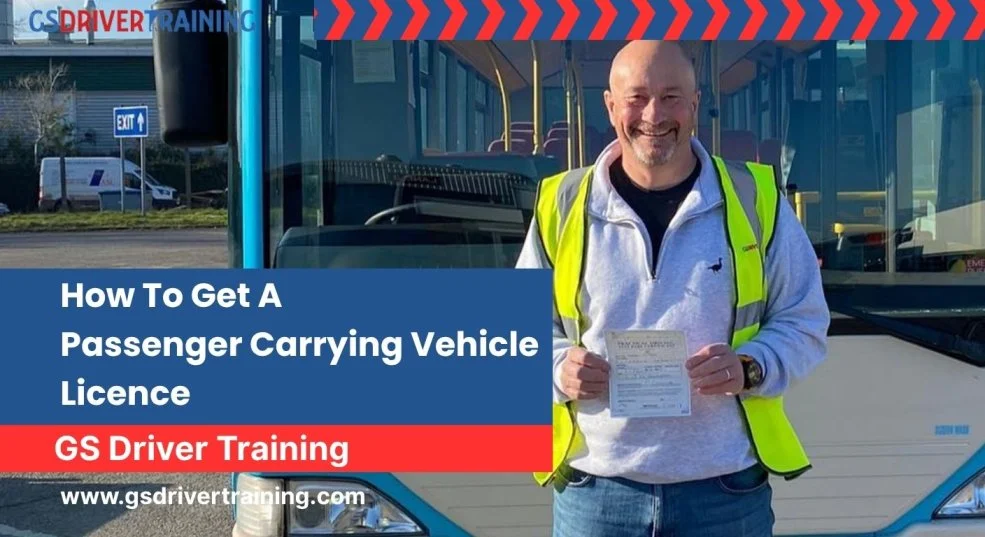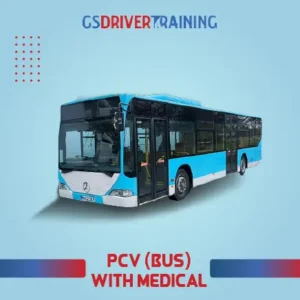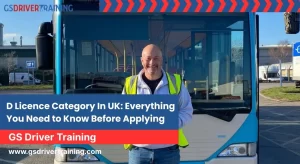If you’ve ever dreamed of driving a bus, coach, or minibus in the UK, getting a Passenger Carrying Vehicle (PCV) licence is your first step. A PCV licence allows you to carry passengers for hire or reward, opening doors to a wide range of professional driving jobs in public transport, tourism, and private hire sectors.
Whether you’re looking to become a full-time bus driver, run your own minibus business, or simply expand your driving qualifications, understanding the process to get a Passenger Carrying Vehicle licence is essential.
This blog explains everything you need to know — from licence categories, eligibility, medical requirements, and training, to the final test stages and career opportunities.
What Is a Passenger Carrying Vehicle Licence?
A Passenger Carrying Vehicle (PCV) licence is a special category of driving licence that authorises you to drive vehicles designed to carry passengers. It’s often referred to as a bus licence or coach licence.
PCV licences are issued by the Driver and Vehicle Licensing Agency (DVLA) in the UK. They’re required for anyone who wants to drive a vehicle with more than eight passenger seats for commercial or professional purposes.
Types of PCV Licences
There are different types of PCV licences depending on the size and type of passenger vehicle you plan to drive. Let’s look at each one:
1. Category D1 – Minibus Licence
- Allows you to drive minibuses with 9 to 16 passenger seats.
- You can tow a trailer up to 750 kg.
- Ideal for school drivers, community transport, and small private hire services.
2. Category D1+E – Minibus with Trailer
- Same as D1, but allows towing a trailer over 750 kg.
- Useful if you carry luggage or extra equipment.
3. Category D – Bus or Coach Licence
- Permits driving any bus or coach with more than 16 passenger seats.
- You can also tow trailers up to 750 kg.
- This is the standard licence for public transport and coach companies.
4. Category D+E – Bus with Trailer
- Same as Category D, but allows towing a trailer over 750 kg.
- Common for long-distance coach drivers who need extra luggage space.
Who Can Apply for a PCV Licence?
Before applying, you need to meet certain requirements:
1. Age Requirement
- You must be at least 18 years old to apply for most PCV licences.
- For larger passenger vehicles (Category D), you must be 21 or over unless you’re training under certain approved programs.
2. Existing Driving Licence
- You must already hold a full Category B (car) driving licence.
3. Medical Fitness
- You must pass a DVLA medical exam to ensure you’re fit to drive passenger vehicles safely.
4. Good Driving Record
- Your driving record should be clean. Any serious offences or disqualifications may affect your application.
Step-by-Step Guide: How to Get a Passenger Carrying Vehicle Licence in the UK
Now that you know the basics, let’s go through the full process step-by-step.
Step 1: Apply for a Provisional PCV Licence
You’ll need a provisional PCV licence before you can start training or take the driving test.
- Download form D2 (application) and form D4 (medical) from the DVLA website.
- The D4 form must be completed by a registered doctor or optician.
- Once completed, send both forms along with your existing licence to the DVLA.
Step 2: Take a Medical Examination
Medical fitness is crucial when driving vehicles carrying passengers.
- A registered GP or private doctor must fill out your D4 medical form.
- The examination checks your vision, blood pressure, heart health, and general fitness.
- The doctor submits this form to the DVLA for review.
If approved, you’ll receive your provisional PCV licence, allowing you to start training.
Step 3: Complete Driver CPC Training
To drive passenger vehicles professionally, you need a Driver Certificate of Professional Competence (Driver CPC).
There are two parts to the CPC:
- Initial CPC (for new drivers)
- Periodic CPC (for experienced drivers, renewing every 5 years)
The initial CPC includes both theory and practical tests. It ensures you have the knowledge and skills to drive safely and efficiently.
Step 4: Pass the Theory Tests
Once you have your provisional licence, it’s time to pass your PCV theory test, which has two sections:
1. Multiple-Choice Test
-
- 100 questions about road safety, vehicle handling, and driving laws.
- You must score at least 85/100 to pass.
-
- You’ll watch 19 video clips and identify potential hazards.
- The pass mark is 67 out of 100.
Both tests can be taken at your local DVSA test centre.
Step 5: Start Practical PCV Training
Your instructor will guide you through:
- Vehicle controls and safety checks
- Passenger loading and unloading
- Handling wide turns and narrow roads
- Emergency procedures
- Eco-driving techniques
Step 6: Pass the Practical Driving Test
Once your instructor feels you’re ready, you’ll take your PCV practical test.
The test has two parts:
The test has two parts:
1. Driving Ability Test (Module 3a & 3b)
-
- Module 3a: Off-road exercises (like reversing and braking).
- Module 3b: On-road driving test lasting around 90 minutes.
2. CPC Practical Demonstration (Module 4)
-
- Tests your ability to handle real-life situations.
- Includes safety checks, passenger management, and emergency scenarios.
You must pass both modules to receive your full PCV licence and Driver CPC card.
Step 7: Get Your Driver Qualification Card (DQC)
Once you’ve passed all modules, you’ll receive your Driver Qualification Card (DQC) from the DVSA.
This card confirms your legal qualification to drive passenger vehicles for hire or reward in the UK.
This card confirms your legal qualification to drive passenger vehicles for hire or reward in the UK.
Keep this card with you whenever you’re driving a PCV vehicle — it’s a legal requirement.
Step 8: Find Employment or Start Driving Professionally
After getting your PCV licence and CPC card, you’re ready to start your professional driving career.
You can now apply for jobs such as:
You can now apply for jobs such as:
- Bus or coach driver
- Airport shuttle driver
- School transport driver
- Minibus operator
- Tour and travel company driver
There are numerous opportunities in both public and private sectors, with growing demand for professional PCV drivers across the UK.
How Long Does It Take to Get a PCV Licence?
The process can vary depending on your schedule and training provider, but on average:
| Medical & Provisional Licence | 2–3 weeks |
| Theory Tests | 1–2 weeks |
| Practical Training | 1–3 weeks |
| Final Test & CPC Card | 1–2 weeks |
|
Total Duration
|
6–10 weeks (approx.)
|
How Much Does It Cost to Get a PCV Licence?
Here’s an approximate breakdown:
| Medical Exam | £50–£100 |
| Provisional Licence Application | Free |
| Theory Tests | £37–£50 |
| Hazard Perception Test | £15–£25 |
| Driver CPC Training & Test | £1,000–£2,000 (depends on provider) |
|
Total Cost
|
£1,200–£2,500
|
Prices may vary depending on your training centre, location, and course type.
Renewing Your PCV Licence
Once you’ve obtained your licence, you must renew it every 5 years (and every year after age 65).
You’ll need to:
You’ll need to:
- Submit a new medical report (D4)
- Apply for renewal through the DVLA
Staying medically fit and completing periodic CPC training (35 hours every 5 years) keeps your licence valid and up to date.
Tips for Success
- Choose a DVSA-approved training centre with a good pass rate.
- Book your theory and practical tests well in advance to avoid delays.
- Practice hazard perception using online mock tests.
- Keep all your paperwork (licence, D4, D2 forms, CPC certificates) organised.
- Always stay updated with DVLA driving rules and CPC regulations.
You Can Also Read: How to get an HGV licence?
Conclusion
Getting a Passenger Carrying Vehicle (PCV) licence in the UK might seem like a long process, but it’s a clear and structured journey.
Once you’ve completed your training and obtained your licence, you’ll gain access to a wide range of driving opportunities — from local bus routes to international coach tours.
Once you’ve completed your training and obtained your licence, you’ll gain access to a wide range of driving opportunities — from local bus routes to international coach tours.
Whether you’re looking for a stable job, a change of career, or a new skill, a PCV licence gives you the freedom and flexibility to drive passengers safely and professionally across the UK.







